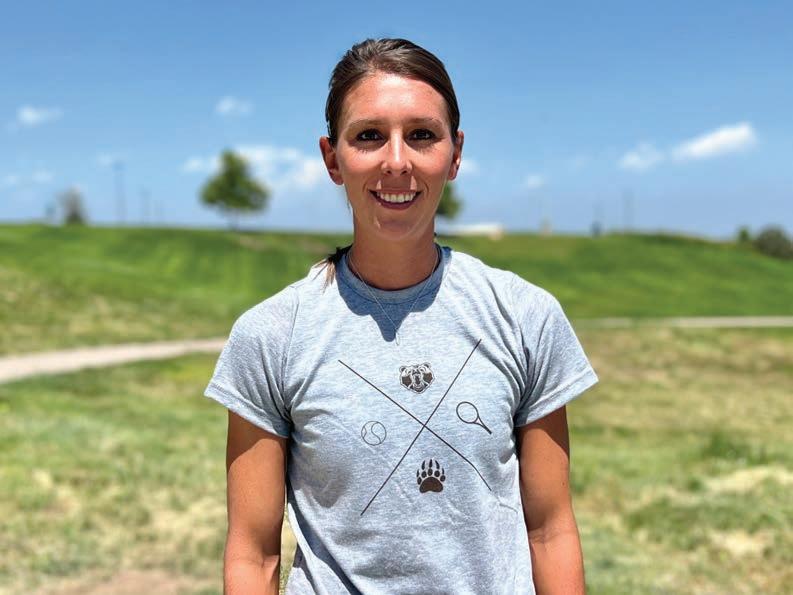
5 minute read
Impossible? Don’t tell Jordan Clark that
ThunderRidge assistant coach set to play pro soccer in Sweden
BY ALEX K.W. SCHULTZ SPECIAL TO COLORADO COMMUNITY MEDIA
It was a shot heard ‘round the world — ‘round the La Liga world, at least.
e shot also happened around the world, o the northeast coast of Spain, every bit of 5,000 miles away from the cozy suburbs of Denver.
On Oct. 2, 2021, in the 17th minute of a match between the Alaves and Barcelona women’s soccer clubs at Johan Cruy Stadium, Alaves’ Nerea Nevado dropped a corner kick into a cluster of players camped outside Barcelona’s goal. e set piece was headed into the upper left corner of the cage, past a diving Barcelona goalkeeper, for a 1-0 Alaves lead.
is was no small thing. Consider: Barcelona hadn’t conceded a single goal up to that point in the season, dismantling its four previous opponents by a combined score of 26-0.
Also consider: Barcelona didn’t lose a single game that season, stomping to a 30-0 record and outscoring the opposition 159-11 on its way to a third consecutive La Liga crown (Barcelona went on to win the La Liga title the following year as well).
Needless to say, scoring against Barcelona, an eight-time La Liga and nine-time Copas de la Reina cham- pion, is a big deal.

You could easily call a moment like that “surreal” or “unbelievable” or one of life’s “top moments.” at’s what the one who put the ball in the net called it, which was certainly warranted in and of itself but especially after everything she’d been through.
Her name: Jordan Clark, a Littleton resident and underRidge’s assistant boys tennis coach.
“To have that moment nally come through and be the rst one to score against them, it was just total elation bursting out all in one second,” Clark said. “ e most unreal moment I could’ve imagined in my soccer career thus far, for sure.”
Listen closely. “ us far,” the soonto-be 34-year-old said. at’s right, the sun hasn’t set on Clark’s soccer career just yet.
Signed with Swedish club
Clark recently inked a contract to play for Sweden soccer club Vetlanda for the 2023-24 season. She’s set to leave for the Nordic country on Aug. 5.
“I keep having to come to these potential crossroads where I have to almost `face my mortality’ as a professional soccer player,” Clark said. “I believe in it. I know I can still play. It’s just a matter of whether an opportunity’s still going to be there.
“If I just keep my head down and keep working hard and trying and hoping and believing that something’s there, so far, it’s worked out.” at opportunity came from across the Atlantic, in Karlsruhe, Germany, home to second-tier club Karlsruher FC. Clark was the team’s leading scorer in 2013-14. Impressive, yes. Even more impressive: She played the whole season on a broken ankle.
Hard work, hope, belief, a neversurrender mentality — those are what have fueled Clark her whole life.
She started as a true freshman at the University of Akron in Ohio. Despite tearing her ACL the following year and redshirting, she went on to become a two-year team captain as an upperclassman.
In 2012, a month before she graduated from Akron, the U.S.’s top-level professional women’s soccer league folded, forcing Clark to look elsewhere for an opportunity to continue playing the beautiful game.
“ at might not have been the wisest decision,” Clark said, chuckling.
After returning to the states, Clark participated in numerous tryouts for the new National Women’s Soccer League, but the answer was always the same: “I got told I did really well, but there was always some reason why I wasn’t going to get signed on and picked up.”
A few years later, Sola Abolaji,
Clark’s connections-rich trainer, said there was a potential opportunity for his pupil in Austria. Clark boarded the rst plane she could get on. She landed in Vienna on her 32nd birthday.
Same story, though. “I played for several days. I played against Bayern Munich in a scrimmage. e coach said he wanted me, but the club had di erent reasons — nances, paperwork, whatever it was — for not being able to take me on.”
Clark stayed in Austria for a week with “nothing on the horizon,” she said. at is, nothing but hope, belief and a never-surrender mentality.
Close calls
One evening, Clark’s phone rang. It was Abolaji back in the U.S. e news wasn’t great.
“I think I’ve exhausted all my options. We’re running out of time in the transfer window. It just seems like there’s nothing out there. We’ll have to have you come back home and try again for the next window,” Clark recalled Abolaji saying.
Just as the two were getting ready to hang up with each other, Abolaji paused. “Hold on, I’m getting a call. Let me get right back to you,” he told Clark.
On the other line was Ella Masar, who played on the U.S. women’s national soccer team in the late 2000s. ere was an opportunity in Spain.
After participating in a trial for Madrid CFF but not being o ered a spot on the team, one more opportunity materialized. It was a threehour train ride away from Madrid, in the bustling city of Vitoria-Gasteiz. e team’s name was Alaves, a club newly promoted to La Liga.
Time was running out. is was certainly Clark’s last chance.
After practicing in front of Alaves coaches and playing in a scrimmage against Osasuna, Clark heard four of the most beautiful words: “Yeah, we’ll take her.”
She signed to play for Alaves hours before the transfer window closed for the season.
“It was very, very satisfying to have nally broken through, because I always had this inner belief that I had that possibility and that I was good enough and just needed that one little door to open and someone to take a chance,” Clark said. “It was a true testament to belief and hard work and just sticking to it and not accepting failure as a deterrent but just as another opportunity to learn and try again.”
It wasn’t all sunshine and rainbows after that magical season in Spain, though.
Club in ghting led to Clark’s Alaves contract not being renewed for the following season.
And before she landed with Vetlanda, she actually signed on the dotted line to play for a club in Greece, but because of a strange rule stipulating that only three foreign players could be on the team, her contract was voided.
“It’s crazy being in the midst of this world,” Clark said. “You have no idea that any of these factors and variables could even be a possibility until they just walk right into you.”
Future hopes
Clark said she ultimately wants to start her own sports academy and teach athletes young and old about important sports concepts like decision-making, reaction time, vision, recovery and pain management (Clark studied nursing as an undergraduate student and sports science and coaching as a graduate student at Akron).
She’s also refusing to completely let go of her long-held dream of playing for the U.S. women’s national team, which might sound crazy to some given that she’s closing in on her mid-30s.
But Clark has turned crazy into reality many times before. She’s overcome broken bones and torn ligaments. She’s silenced a lot of naysayers. And, remember, she’s scored against and wounded the Barcelona machine when most others have only dreamed of doing so. It’d be foolish to count her out at this point.
“Where I’m at now age-wise and experience-wise, it’s very, very unlikely,” Clark said of playing for the national team. “But I’m not taking it o the table completely, just because I’ve already done some impossible things. I can’t not believe in the impossible a little bit.”








